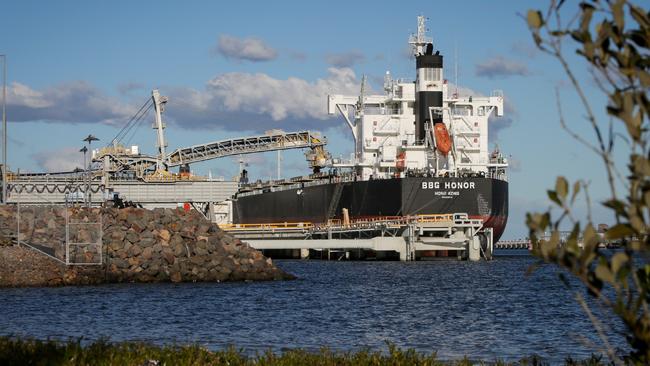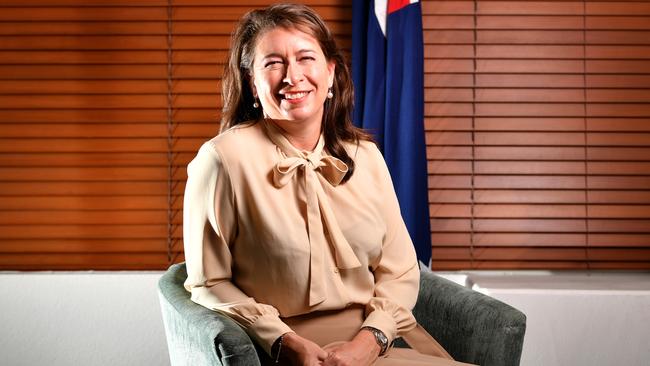Vikki Campion: Questions must be answered over Chinese ownership of Newcastle Port
If we are going to get into bed with China, shouldn’t we at least know what we are giving them in return for their share of the doona, asks Vikki Campion.
Opinion
Don't miss out on the headlines from Opinion. Followed categories will be added to My News.
If you have decided that our bed partners in politics are the story, then you should be interested in at least what country we are in bed with — and what we are giving them in return for their share of the doona.
While pages have been dedicated to the newest relationships of MPs, most recently Anthony Albanese and Christian Porter, there is a relatively stark silence about an issue of foreign ownership of our national assets, made more disturbing by its obscurity.

It began with a line in the May budget that made no sense to most, and where alarm bells did not ring until this week’s Senate estimates.
In 2014, the NSW government privatised the Port of Newcastle and it is now half-owned by a Chinese corporation with direct links to the Chinese Communist Party.
This corporation, which openly states it is guided by “Xi Jinping thought on socialism with Chinese characteristics”, has control over the pricing of our coal exports through the port.
Seven years ago we had Julia Gillard’s Asian Century, and we saw China’s burgeoning middle class as a river of gold for our trade, travel and education.
The jewel in the crown of the international coal trade is the Port of Newcastle, so dominant globally that coal is priced after it — but with this budget item, questions are asked if this would allow China to rob us of our debt-paying commodity and achieve its publicly stated objective of building a robotic container terminal at the port.

When Townsville-based Senator Susan McDonald asked if the conditions that allowed the port to be sold to China in 2014 would be accepted today, she was told by bureaucrats that she was asking “hypothetical” questions.
“This acquisition predates those reforms,” she was told.
When asked if it was accepted that the China Merchants Group was a key actor in the Belt and Road Initiative, the bureaucrats said: “That’s not something we have an answer for right here.”
When pressed further, they said: “We are getting into the territory of becoming quite specific.” We cannot afford to allow our concerns about foreign ownership of national infrastructure to be obfuscated by suits under the glare of committee lights.
Parliamentary estimates are held to get into the grit — and if the Coalition’s own Senate team is concerned enough to dedicate lines of questioning in regards to the domination China will hold over our top commodity, the bureaucracy should answer, rather than in one case spending more than six minutes garbling to one question without providing a thread of transparency.

Yes, they agreed under Senator Matt Canavan’s questioning that there had been a consultation process into a review of national access. No, the bureaucrats said, no submissions had been made public.
A final report had not been written — yet, they had made changes in the May budget. So was the consultation held in good faith? An emphatic “yes”.
We have a globally significant port that China now has a 50 per cent stake in, with an obscure budget line that poses to replace it with a robot container terminal — yet most questions senators addressed to the top bureaucrats were abandoned to be answered: “On notice.”
Through their vagueness, they have lost — they drown in the wake of their power.
Sources say they will bring the changes in a giant omnibus Bill next sitting, where detail will be lost in the volume.
Australian politics, a few years ago, appeared naive about the wider ramifications of a totalitarian regime’s investment in our farms, land, ports and mines.
We sat back as Rio Tinto, our largest iron ore miner, went within a whisker of being sold to Chinese state-owned enterprise Chinalco.
Australia supplies China with about 60 per cent of its iron ore needs which it uses, among many other things, to build its military. Perhaps uncomfortable with that relationship, China is developing alternatives.
With the West slowly cottoning on, China’s brutal communist regime has pivoted to paying off tin-pot dictatorships. Right now they are buying their way into new iron ore in the West African nation of Guinea to undercut Australia biggest export commodity through alleged forced labour and the use of child workers.
China has poured trillions into Africa through the Belt and Road Initiative, loaning ludicrous amounts of money to impoverished countries, knowing they can repossess key infrastructure when they miss their repayments.
Our world view from 2014 must change. Democracy and a liberal rule-based system are in retreat. Our form of government in Australia is in the distinct minority.
If you treasure this system, and the freedoms it bought you, and you want your children to experience it to the extent you did, then it must go beyond rhetoric to the substance of our strength.
Our ownership of the largest coal-exporting port in the world is a vital part of this.
If the government wants to get under the doona with China, we should at least consider the divorce bill first.



